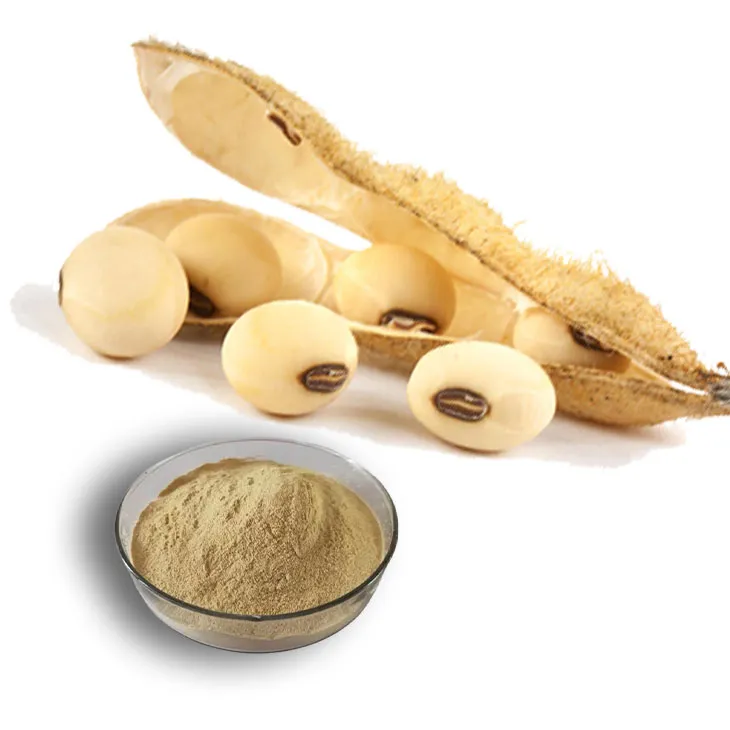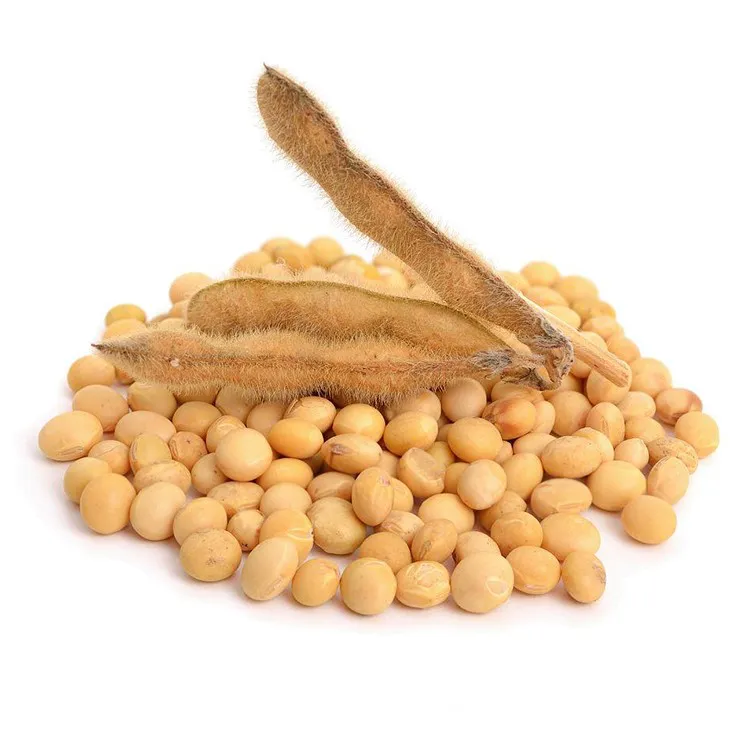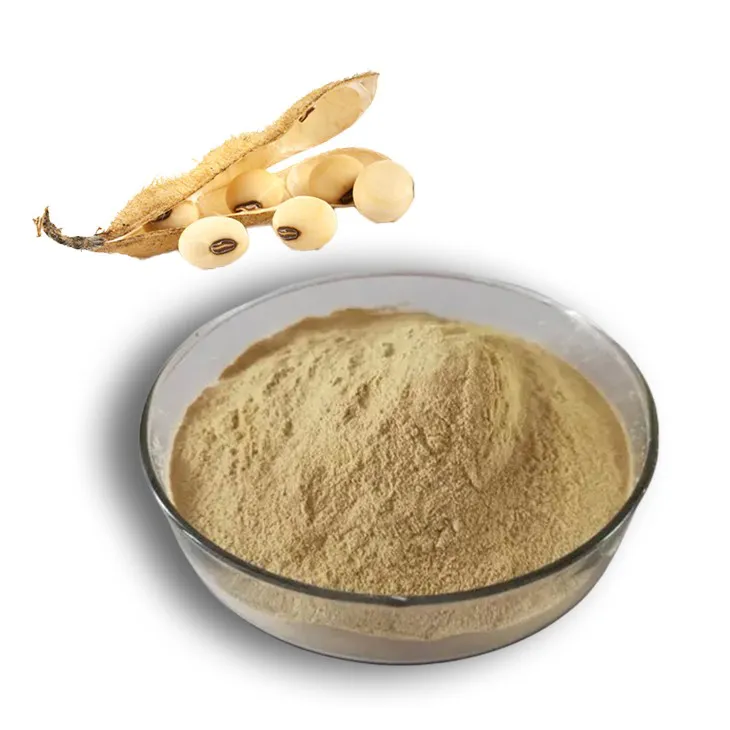- 0086-571-85302990
- sales@greenskybio.com
Use soy extracts? Make sure you source from sustainable suppliers!
2024-12-15

Introduction
Soy Extracts have become increasingly popular in various industries, from food and beverage to cosmetics and pharmaceuticals. However, not all Soy Extracts are created equal. Sustainable sourcing of Soy Extracts is not only an ethical choice but also a smart business decision. In this article, we will explore the reasons why it is crucial to source soy extracts from sustainable suppliers.

The Importance of Sustainable Sourcing
Sustainable sourcing refers to the procurement of goods and services in a way that takes into account environmental, social, and economic factors. When it comes to soy extracts, sustainable sourcing has several important implications.
Environmental Benefits
One of the main environmental benefits of sustainable sourcing of soy extracts is the reduction of the carbon footprint in the supply chain. Soy production can have a significant impact on the environment, particularly through deforestation and the use of pesticides and fertilizers. By sourcing from sustainable suppliers, companies can ensure that their soy extracts are produced in an environmentally friendly manner.
- Sustainable soy suppliers often use more sustainable farming practices, such as crop rotation and reduced tillage. These practices can help to improve soil health, reduce erosion, and sequester carbon in the soil.
- They may also use renewable energy sources in their production processes, further reducing their carbon footprint. For example, some soy farms are powered by solar or wind energy.
Social Benefits
Sustainable sourcing of soy extracts can also have significant social benefits.
- It can promote fair trade in the soy market. Many sustainable soy suppliers work with small - scale farmers and ensure that they receive a fair price for their products. This can help to improve the livelihoods of farmers and their families, and contribute to the economic development of rural communities.
- Additionally, sustainable sourcing can help to ensure the health and safety of workers in the soy industry. Sustainable suppliers are more likely to follow labor laws and regulations, and provide a safe working environment for their employees.
Quality Assurance
Sourcing soy extracts from sustainable suppliers can also guarantee the quality of the product.
- Sustainable suppliers are more likely to use pure and uncontaminated soybeans in their production processes. This is because they are often more committed to quality control and food safety.
- They may also use more advanced processing techniques to ensure that the soy extracts retain their nutritional value and beneficial properties.

Challenges in Sourcing Sustainable Soy Extracts
While the benefits of sustainable sourcing of soy extracts are clear, there are also several challenges that companies may face when trying to source from sustainable suppliers.
Limited Supply
One of the main challenges is the limited supply of sustainable soy extracts. Currently, the majority of soy production is still not sustainable, and there are relatively few suppliers who can provide high - quality, sustainable soy extracts.
- This can make it difficult for companies to source enough soy extracts to meet their production needs. In some cases, they may need to pay a premium price for sustainable soy extracts, which can increase their production costs.
- Additionally, the limited supply can also lead to competition among companies for sustainable soy extracts, further driving up prices.
Lack of Transparency
Another challenge is the lack of transparency in the soy supply chain. It can be difficult for companies to verify whether their suppliers are truly sustainable.
- There are currently no universal standards or certifications for sustainable soy production, which makes it hard for companies to compare different suppliers.
- Some suppliers may claim to be sustainable without actually meeting the necessary criteria. This can lead to "greenwashing", where companies are misled into believing that they are sourcing sustainable soy extracts when in fact they are not.

Strategies for Sourcing Sustainable Soy Extracts
Despite these challenges, there are several strategies that companies can use to source sustainable soy extracts.
Build Relationships with Suppliers
One strategy is to build long - term relationships with sustainable suppliers. By working closely with suppliers, companies can gain a better understanding of their production processes and verify their sustainability claims.
- This can involve regular site visits to the suppliers' farms or production facilities. During these visits, companies can observe the farming practices, working conditions, and quality control measures in place.
- They can also establish clear communication channels with suppliers to ensure that any issues or concerns are addressed promptly.
Support Certification Programs
Another strategy is to support certification programs for sustainable soy production. While there are currently no universal standards, there are several well - recognized certification programs that can help companies to identify sustainable suppliers.
- For example, the Roundtable on Sustainable Soy (RSS) is an international initiative that promotes sustainable soy production. Suppliers who are certified by the RSS have to meet certain environmental, social, and economic criteria.
- By supporting these certification programs, companies can encourage more suppliers to adopt sustainable practices and increase the availability of sustainable soy extracts.
Diversify Supply Sources
Companies can also diversify their supply sources to include more sustainable suppliers. This can help to reduce their dependence on a single supplier and increase their access to sustainable soy extracts.
Conclusion
In conclusion, sustainable sourcing of soy extracts should be a top priority for any consumer or business. It offers numerous environmental, social, and quality - related benefits. While there are challenges in sourcing sustainable soy extracts, such as limited supply and lack of transparency, there are also strategies that can be employed to overcome these obstacles. By building relationships with suppliers, supporting certification programs, and diversifying supply sources, companies can ensure that they are sourcing high - quality, sustainable soy extracts. This not only benefits the environment and society but also helps to safeguard the long - term success of their business.
FAQ:
What are the benefits of sourcing soy extracts from sustainable suppliers?
There are several benefits. Firstly, it helps reduce the carbon footprint in the supply chain. This is important for environmental conservation as it lessens the overall environmental impact of soy production and distribution. Secondly, it promotes fair trade in the soy market. This ensures that farmers and workers involved in the soy production process are fairly compensated for their efforts. Finally, sustainable suppliers are more likely to provide pure and uncontaminated soy extracts, which is crucial for the quality and safety of products using soy extracts.
How can one identify a sustainable soy extract supplier?
One can look for several indicators. Certifications such as Fairtrade or organic certifications can be a good sign. These certifications often have strict criteria regarding environmental protection, fair labor practices, and quality control. Additionally, researching the supplier's supply chain transparency is important. A sustainable supplier should be able to provide information about where the soy is sourced from, how it is grown, and what measures are taken to ensure sustainability. Another aspect is to look at the supplier's reputation in the industry. Reviews from other customers or industry experts can give insights into their sustainability practices.
Why is reducing the carbon footprint in the soy extract supply chain important?
The soy industry can have a significant impact on the environment. Reducing the carbon footprint in the supply chain helps in minimizing greenhouse gas emissions. This includes emissions from farming activities such as the use of fertilizers and machinery, as well as transportation and processing. By choosing suppliers who focus on reducing their carbon footprint, consumers and businesses are contributing to global efforts to combat climate change and protect the environment for future generations.
What role does fair trade play in the soy market when sourcing soy extracts?
Fair trade in the soy market ensures that farmers and workers receive fair prices for their products and labor. This helps to improve their living standards and economic stability. It also encourages sustainable farming practices as farmers are more likely to invest in environmentally friendly methods when they are fairly compensated. For businesses, sourcing from fair trade suppliers can enhance their corporate social responsibility image and attract consumers who are conscious about ethical purchasing.
How does sustainable sourcing of soy extracts affect product quality?
Sustainable sourcing often leads to better product quality. Sustainable suppliers are more likely to follow strict quality control measures. For example, they may ensure that the soy is grown without excessive use of pesticides or other contaminants, which can affect the purity of the soy extracts. Also, sustainable farming practices can result in soy with better nutritional content, which in turn can enhance the quality of products made with soy extracts.
Related literature
- Sustainable Soy Sourcing: A Guide for Businesses"
- "The Importance of Sustainable Supply Chains in the Soy Industry"
- "Fair Trade and Sustainability in Soy Production"
- ▶ Hesperidin
- ▶ citrus bioflavonoids
- ▶ plant extract
- ▶ lycopene
- ▶ Diosmin
- ▶ Grape seed extract
- ▶ Sea buckthorn Juice Powder
- ▶ Beetroot powder
- ▶ Hops Extract
- ▶ Artichoke Extract
- ▶ Reishi mushroom extract
- ▶ Astaxanthin
- ▶ Green Tea Extract
- ▶ Curcumin Extract
- ▶ Horse Chestnut Extract
- ▶ Other Problems
- ▶ Boswellia Serrata Extract
- ▶ Resveratrol Extract
- ▶ Marigold Extract
- ▶ Grape Leaf Extract
- ▶ blog3
- ▶ blog4
- ▶ blog5
-
Pure 85% Tomentil Extract.
2024-12-15
-
Agaricus Blazei Extract
2024-12-15
-
Senna Leaf Extract
2024-12-15
-
Yellow Pine Extract
2024-12-15
-
Thunder God Vine Extract
2024-12-15
-
Black Garlic Extract
2024-12-15
-
Shikone Extract
2024-12-15
-
Coix Seed Extract
2024-12-15
-
Cactus Extract
2024-12-15
-
Hawthorn Extract
2024-12-15
-
Mulberry leaf Extract
2024-12-15





















